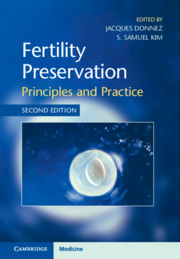Book contents
- Fertility Preservation
- Fertility Preservation
- Copyright page
- Dedication
- Contents
- Contributors
- Foreword
- Foreword
- Preface
- Section 1 Introduction
- Section 2 Reproductive Biology and Cryobiology
- Section 3 Fertility Preservation in Cancer and Non-Cancer Patients
- Section 4 Fertility Preservation Strategies in the Male
- Section 5 Fertility Preservation Strategies in the Female: Medical/Surgical
- Section 6 Fertility Preservation Strategies in the Female: ART
- Section 7 Ovarian Cryopreservation and Transplantation
- Section 8 In Vitro Follicle Culture
- Chapter 28 Molecular and Cellular Integrity of Cultured Follicles
- Chapter 29 In Vitro Growth of Human Oocytes
- Chapter 30 Contributions of Ovarian Stromal Cells to Follicle Culture
- Chapter 31 In Vitro Maturation of Germinal Vesicle Oocytes
- Chapter 32 Survival of Primordial Follicles
- Section 9 New Research and Technologies
- Section 10 Ethical, Legal, and Religious Issues
- Index
- References
Chapter 32 - Survival of Primordial Follicles
Tips and Tricks
from Section 8 - In Vitro Follicle Culture
Published online by Cambridge University Press: 27 March 2021
- Fertility Preservation
- Fertility Preservation
- Copyright page
- Dedication
- Contents
- Contributors
- Foreword
- Foreword
- Preface
- Section 1 Introduction
- Section 2 Reproductive Biology and Cryobiology
- Section 3 Fertility Preservation in Cancer and Non-Cancer Patients
- Section 4 Fertility Preservation Strategies in the Male
- Section 5 Fertility Preservation Strategies in the Female: Medical/Surgical
- Section 6 Fertility Preservation Strategies in the Female: ART
- Section 7 Ovarian Cryopreservation and Transplantation
- Section 8 In Vitro Follicle Culture
- Chapter 28 Molecular and Cellular Integrity of Cultured Follicles
- Chapter 29 In Vitro Growth of Human Oocytes
- Chapter 30 Contributions of Ovarian Stromal Cells to Follicle Culture
- Chapter 31 In Vitro Maturation of Germinal Vesicle Oocytes
- Chapter 32 Survival of Primordial Follicles
- Section 9 New Research and Technologies
- Section 10 Ethical, Legal, and Religious Issues
- Index
- References
Summary
According to the European Society of Human Reproduction and Embryology (ESHRE) Working Group on Oocyte Cryopreservation [], between 2010 and 2014, cancer patients in Europe underwent similar numbers of ovarian tissue cryopreservation procedures (~4,400) and oocyte cryopreservation procedures (~3,800). This milestone in the field of ovarian tissue cryopreservation is responsible for a new surge of interest in primordial follicles and their requirements for survival and development, as they represent more than 90% of the follicle population to be cryopreserved. When patients cannot have their frozen-thawed ovarian tissue reimplanted due to the risk of transmission of malignant cells, these follicles can be isolated and grafted inside a bioengineered ovary (see Chapter 36) or grown in vitro (see Chapter 31). We will focus on the latter strategy, more specifically on the main elements that primordial follicles need to survive in vitro.
Information
- Type
- Chapter
- Information
- Fertility PreservationPrinciples and Practice, pp. 364 - 380Publisher: Cambridge University PressPrint publication year: 2021
